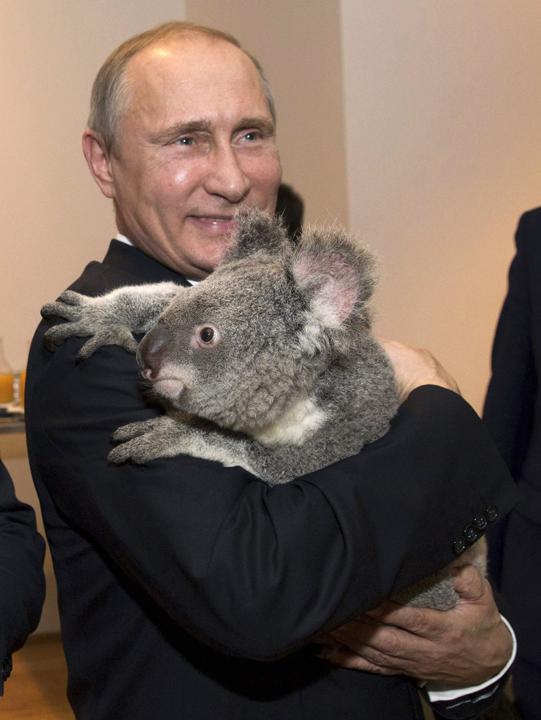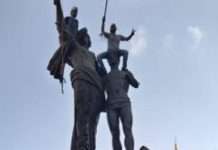Russia stages huge military parade to mark WWII victory
AFP/Ynetnews
Published: 05.09.15 / Israel News
In what is seen as punishment for Kremlin’s meddling in Ukraine, Western countries are boycotting May 9 festivities, leaving Putin to mark day in company of leaders of China, Cuba and Venezuela. Russia on Saturday staged a huge military parade to commemorate the 70th anniversary of victory over Nazi Germany in a conspicuous show of military might amid a standoff with the West over Ukraine. In what is seen as punishment for the Kremlin’s meddling in Ukraine, Western countries led by Russia’s World War II allies are boycotting the May 9 festivities, leaving Vladimir Putin to mark the day in the company of the leaders of China, Cuba and Venezuela.
Russian President Vladimir Putin, in his address to the parade, has said basic principles of international cooperation are increasingly being ignored – an apparent swipe at the United States. The tightly scripted parade marks the surrender of Nazi Germany and the Red Army’s key role in the defeat. Victory Day is Russia’s most important secular holiday, both commemorating the Soviet Union’s huge suffering in the war and highlighting Russia’s portrayal of itself as a force for peace and security. In his short speech on Saturday, Putin said that despite the importance of international cooperation, “in the past decades we have seen attempts to create a unipolar world,” a phrase used by Russia to criticize the United States’ purported aim to dominate world affairs. Around 16,000 troops were taking take part in the parade on Red Square that would also showcase cutting edge weapons such as the next-generation Armata T-14 tank, in one of the biggest Victory Day celebrations in decades.
The Soviet Union lost an estimated 27 million soldiers and civilians in WWII – more than any other country – and the Red Army’s triumph remains an enormous source of national pride. Victory Day unites Russians from all walks of life irrespective of political sympathies and huge crowds were expected to flood into central Moscow. But the Kremlin parade was being overshadowed by the Ukraine crisis, with the West slapping sanctions on Moscow over Russia’s seizure of Crimea and support for separatists in eastern Ukraine. United States President Barack Obama has snubbed the festivities, as have the leaders of Russia’s other key WWII allies Britain and France. German Chancellor Angela Merkel has ducked out of attending the parade but will fly to Moscow on Sunday to lay a wreath at the grave of the Unknown Soldier and meet Putin.
The most high-profile guests on the podium next to Putin wiltnl be Chinese leader Xi Jinping, United Nations chief Ban Ki-moon, and India’s President Pranab Mukherjee. Other presidents attending were Abdel Fattah al-Sisi of Egypt, Raul Castro of Cuba, Nicolas Maduro of Venezuela, Robert Mugabe of Zimbabwe and Jacob Zuma of South Africa. The 70th anniversary celebrations stand in contrast to the festivities a decade ago, when Putin hosted the leaders of the United States, France, Germany, Italy and Japan.
Show of military might
On Saturday morning, many Muscovites sported garrison caps and black and orange striped ribbons that have become a symbol of patriotism in recent years. Over 70 percent of Russians say a close family member was killed or went missing during the war, making Victory Day an emotional symbol of unity for the nation. Later in the day around 200,000 people were expected to march through Red Square with portraits of relatives who fought in the war, in a Kremlin-backed campaign dubbed the “Immortal Regiment”.
In recent years, victory in what Russians see as a 1941-1945 conflict, known in Russia as the Great Patriotic War, has been raised to cult status and critics accuse Putin of seeking to co-opt the country’s history to boost his personal power. The Kremlin has also used WWII narratives to rally support for its current political agenda, for example painting the Ukrainian government as Nazi sympathisers. This year the parade will see over a hundred military planes — including long-range nuclear bombers — swoop over Moscow in a spectacular fly-by.
Also on show for the first time will be some of the Russian military’s latest weaponry designed to replace creaking Soviet-era equipment. One of the most prominent is the latest generation Armata T-14 tanks, which represent a key part of the major overhaul of Moscow’s armoury. Smaller parades in 25 other cities will involve 25,000 soldiers and even nuclear submarines, according to the defence ministry.


















